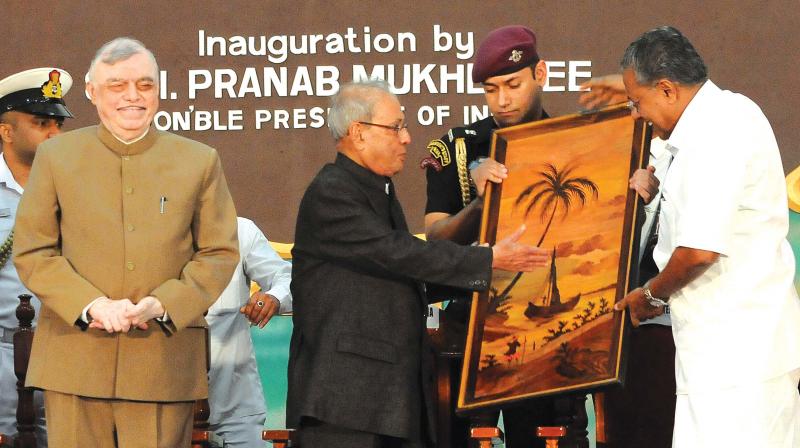President Mukherjee for protecting right to disagree
President said, “We must keep our eyes open for unfamiliar ideas and be ready to consider a range of different inferences and assumptions.â€

Thiruvananathapuram: President Pranab Mukherjee has said that the freedom to doubt, disagree and dispute intellectually must be protected as an essential pillar of democracy. “Nothing should lie outside the realm of reason and, therefore, of discussion and argument. Such freedom is vital for the progress in any field,” Mr Mukherjee said.
Inaugurating the 77th session of Indian History Congress on the Kerala University Campus at Karyavattom on Thursday, he said, “We must keep our eyes open for unfamiliar ideas and be ready to consider a range of different inferences and assumptions.”
Asserting that India’s greatest strength is its pluralism and social, cultural and linguistic diversity, he said the country’s traditions have celebrated the “argumentative Indian and not the intolerant Indian.”
There has been an “unfortunate tendency” in the country from time-to-time to take umbrage at the expression of any view perceived to be hostile to our social or cultural institutions, past or present, Mr Mukherjee said. Similarly, critical appraisals of heroes and national icons of the past have been met with hostility or sometimes even violence, he pointed out.
“No society is perfect and history must also be seen as a guide on what went wrong and what were the contradictions, deficiencies and weaknesses of the past. An objective pursuit of history, such as our best historians have attempted, requires an impartial mind of a judge and not the mind of an advocate,” he said.
He also warned historians against the intrusion of personal prejudice into historical interpretation.
“In my view, every branch of knowledge prospers only when clinical objectivity is maintained,” he said. “It is often the case in history that evidence is either so scarce that the room for speculation is extremely wide or is so massive that the historian is unable to explore more than a small part of the available data,” he said.
“It is natural to love one’s country and see as much glory in its past as one can detect. However, patriotism should not result in blinkered approaches to interpreting history or a compromise with truth to justify an argument of choice,” he said.
“There is no conflict or contradiction between the promotion of regional history and the pursuit of the history of the country as a whole,” he said. Chief Minister Pinarayi Vijayan and Opposition Leader Ramesh Chennithala alleged that attempts were being made by vested interests to distort history to suit the present government at the centre.
Mr Mukherjee released the first copy of the proceedings of the Congress by presenting it to the chief minister. Governor P. Sathasivam, ministers Kadakampally Surendran and C. Raveendranath, Kerala University Vice-Chancellor Dr P.K. Radhakrishnan and Indian History Congress president Prof Shireen Moosvi also attended the function.
President honours Iravatham
President Pranab Mukherjee presented V. K. Rajwade Award of the Indian History Congress to epigraphist and Dravidologist Iravatham Mahadevan at its inaugural function here on Thursday where IHC secretary Ishrat Alam made the announcement. The award instituted by Prof A.R. Kulkarni for lifetime services to the cause of history carries a sum of Rs 50,000.
Mr Mahadevan is known for his successful decipherment of Tamil-Brahmi inscriptions and his expertise on the epigraphy of the Indus Valley Civilisation, on which he has been working for over 40 years. His publications include The Indus Script: Texts, Concordance and Tables (1977).
A Tamil speaker, he has used historical linguistics and statistical studies to examine the Dravidian components in Vedic Sanskrit, and how these might point to interpretations of the Indus Valley script.
A retired IAS officer, he developed an interest in Indian epigraphy while in service. Upon the suggestion of historian Nilakanta Sastri, he began to study cave inscriptions of Tamil Nadu, and took the world of epigraphy by storm, when he published his work on Chera inscriptions of Pugalur, in 1965.

